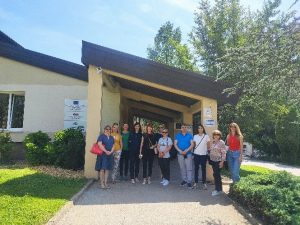Capacity building
In the period from 30th of May till 03rd of June, 2022, 1.5-day Activity 1.1.4 “Training of staff through practical transfer of knowledge and know how on EQAVET linked with ECVET at relevant institutions of the implementing party” was implemented in the Club of Parliamentarians in Skopje. Twenty-nine representatives from Bureau for Development of Education, Adult Education Center, Vocational Education and Training center, Secondary Vocational Schools, Sectorial Councils, NQF Board, and NQF Unit participated in the training.
The participants had presentations by the MS experts on the principles and concepts of competency-based design of qualifications (Lina Vaitkute), comparability and quality assurance of qualifications (Vidmantas Tūtlys), ensuring transparent links among the National Qualifications Framework, occupational standards, and the vocational education and training curricula (Daria Duilovic); Referencing of occupational standards to the National Qualifications Framework (Odeta Kupetienė). The participants worked in groups on practical tasks to analyze currently used Qualifications and Occupational standards, detect shortcomings and to propose improvements.
The training evaluation results demonstrated that the participants were highly satisfied with the training, as all the relevant stakeholders involved in the process of development and implementation of Qualifications and Occupational standards could work together with the MS experts and discuss how to better apply recommendations proposed by the MS experts.
Institutional capacity improvement
Study visit within Activity 4.1.8 was carried out in the period from 13th till 17th of June. Four representatives from the Ministry of Education and Science and one representative from the Vocational Education and Training Center participated in the Study Visit to Slovenia. The Delegation had fruitful discussions at the Institute of the Republic of Slovenia for Vocational Education and Training, the Slovenian Ministry of Education, Science and Sport, Slovenian Quality Assurance Agency for Higher Education, University of Primorska, Biotechnical Educational Centre Grm Novo Mesto and Higher Vocational College for Hospitality, Wellness and Tourism Bled.
The participants together with the hosting institutions discussed the development and update of qualification standards, digital registers, procedures and processes of quality assurance of vocational training and higher education institutions.
Results achieved
On the 28th of June, the 3rd Steering Committee Meeting was held. Prior to the Meeting, the Project Leaders conducted a pre-steering meeting where the MS Project Leader Ms. Agnė Kudarauskienė from Lithuania, the Junior Project Leader Mr. Janez Damjan from Slovenia and Junior Project Leader Ms. Michelle Houppe from France, together with the RTA, Ms. Jolita Butkiene discussed the progress of the Project and further plans and activities.
During the 3rd Steering Committee Meeting, Mr. Agim Shaqiri, the Chief of Cabinet of the Ministry of Education and Science of the Republic of North Macedonia delivered a welcoming note emphasizing the importance of the project and offering the support of the Ministry’s Cabinet for the future period. He reflected on the purpose and importance of NQF and confirmed the dedication of the MoES to use this project for the improvement of the education and training system in North Macedonia. The Chief of Cabinet shared his impressions from the study visit in Slovenia.
During the meeting, RTA Jolita Butkiene presented Bi-annual Report that contained detailed description of all relevant activities within the Budget Headings: The Components Mandatory Results and Horizontal activities related costs, the implementation schedule, information on MS and BC human resources, visibility and communication activities. During the reporting period 107 BC experts and stakeholders participated in project activities lead by 17 MS experts. In total, 24 project events (workshops, focus groups, interviews) were carried out with 155 MS experts’ days, 29 deliverables (reports, recommendations, reviews) were produced. The Member State Component Leader 1 (MC CL) Prof. dr. Vidmantas Tūtlys elaborated on the main findings from the missions performed and outlined the next steps in collaborative activities with the Beneficiary (BC) experts and stakeholders to update the existing regulatory documents in Vocational training and Higher Education. The MS CL 2, Odeta Kupetienė emphasized that good, collaborative relations with the representatives of relevant institutions have been established that will be beneficial for further work. The MS CL 3 and 4, Ms. Urška Marentič, presented implemented activities and provided explanation of the methods used and results achieved in relation to the missions performed.
The next project planning period foresees 11 experts’ missions, with the total of 240 MS expert working days. The main activities will include development of the Manual for practitioners in all higher education and VET institutions, training of staff involved in AQAHE on the methodology and procedures on Quality assurance of NQF; assessment for potential short cycle studies (level 5) and development of vocational qualification in higher education; assessment of the differences and the need for the unification of the title of qualification (ISCED fields/harmonies and standardized); drafting of the NQF Road Map 2020-2023; development of qualification standards in higher education based on learning outcomes; development of practical handbooks on managing and quality assuring of digital input in NQF register. Mr. Aleksandar Sladojević noted that activities of Component 3 will be started in the project Quarter No 5 and emphasized their importance to the BC as they will be concerned with the awareness raising among the main stakeholders on the usage and benefits of NQF. Concluding the meeting, the SCM members made a decision to approve the RWP and Bi-annual Report.
This Newsletter was created and maintained with the financial support of the European Union. Its contents are the sole responsibility of the Twinning project and do not necessarily reflect the views of the European Union’













